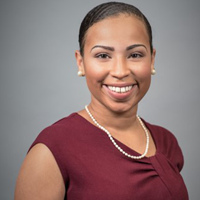Published on October 29th, 2020
By Megan Eales Monroe
People are a driving force in property management, and hiring, onboarding and staffing are some of the most important tasks for a property manager. Of course, finding talented associates and getting them up to speed quickly has never been easy. But now as many property management businesses have gone remote, the hiring and onboarding process is happening at home — challenging leaders to adapt their management styles to a remote environment.
On this episode of The Top Floor, we delve into everything related to hiring, onboarding, and staffing. Along the way, you’ll hear from some of the real estate industry’s best minds, as they share their struggles and successes, and provide proven tactics for better managing new hires.
Listen Now:
Episode Transcript
Narrator: Back in 2019, if you asked a property manager what was slowing growth at their company, there’s a good chance they might offer a response related to hiring, onboarding, training or staffing. At least, that’s what the data suggests. Last year AppFolio put out a survey of property managers in partnership with John Burns Real Estate Consulting.
One-in-three said time spent training new employees versus pursuing business development was slowing growth. Many also said that manual processes – like data entry – were a factor. And finally, over 45 percent said struggles to hire qualified workers was holding them back.
Because of this, companies have increasingly been migrating to cloud-based technology, which aids workflow efficiency, which makes it easier to train and retain new talent. And the arrival of Covid has only accelerated this adoption of new tech. An April 2020 survey of property managers found a majority expect to continue using this new technology permanently, such as virtual showings. And nearly half plan to adopt new tech to prepare their businesses for the future.
Stacy Holden: When it comes to onboarding, especially in 2020, I know there’s a lot of employees that started their employment behind Zoom and not being able to go to the office.
Narrator: Here is AppFolio’s Stacy Holden, Senior Director & Industry Principal:
Stacy Holden: So, I think the biggest challenge really is twofold, one is consistency and making sure that when you leave your training manual or you leave your instructions, that you have the ability to self-serve your answers.
One of the benefits about having electronic workflows within your system is it allows your employees to have self-service. What I mean by self-service is having the ability to answer their own questions or, “Oh gosh, do I do the inspection and then the work orders? Or do I do work orders and then the inspection?” And so, having those things within technology helps.
Let’s switch gears and let’s talk about it from a culture perspective. So, difficult when you are in one state and your headquarters is in another, is staying connected. And so, I think as a property management company, you may be in an office with 25, 50 people, but you will have a leasing agent that is all by themselves and making sure that those people stay connected, whether that is through communication or part of your company culture, or even their personal development plan, having them connected not only in what they need to do and how to do it, but how they feel and are engaged as an employee, I think are two of the biggest challenges. And if you can overcome those and that employee has the desire to come to work every day, even though they come to work by themselves, I think that’s key.
Narrator: Here, Stacy is tracing the arc of a new hire, and how tech can factor into that journey. Virtual meetings – while not a perfect analog to in-person conferences – are a crucial part of onboarding, as are different steps in a software-guided workflow. Digital manuals are good, but they need to facilitate what Holden calls “self-service,” or self-guided problem solving. And that workflow needs to be supported by a culture of clear, open communication. As she points out, fresh recruits are likely to spend a lot of time on their own – so it’s important to help them feel part of the team. By now you might be thinking to yourself, “Woah, this sounds difficult.” Don’t worry, you’re in good company.
Cindy Clare: I grew up where you used a phone, I remember when we got pagers, I know that dates me, but we didn’t have cell phones, we didn’t have those things. And now it’s far beyond just cell phones, it’s the texting, it’s the Alexa. And while you may not be comfortable with those as a leader, you need to learn that others are.
Narrator: Listeners of this podcast may remember Cindy Clare from our earlier episode about leadership and team alignment.
Cindy Clare: I’m the Chief Operating Officer for Bell Partners. And I oversee all of the operations, human resources and marketing, both property marketing and corporate marketing for the company.
Narrator: On top of being COO of Bell Partners – a North Carolina-based apartment management company that manages roughly sixty-thousand units across the country – Cindy is a member and instructor at the Institute of Real Estate Management and a past chair of the National Apartment Association. So she knows more than a thing or two about how to effectively run a team.
Cindy Clare: For me right now, what I hate about the pandemic the most is that I can’t get out on site. And to me that’s critical because if I’m making decisions for the company, I really need to hear what my teams are saying and what they’re feeling, and that’s harder to do remote.
And I do think you’re seeing even with the younger generation, that connection, that person to person connection, while you can certainly do things via Zoom and you can build those connections, it’s not quite the same as the in person. So I think it’s finding the balance between the two. It doesn’t mean that you can’t do remote work, but I know for me, I couldn’t just be remote, I would miss, I miss that interaction, I miss that ability to have the face to face conversations.
Jordan Levine: We were doing all this really prior, though. It’s funny.
Narrator: This is Jordan Levine, a cofounder of Pelican Property Management in Maryland.
Jordan Levine: We would see each other in the office, but we were essentially remote because we were doing everything virtually even though we were right next door to each other. Now that we’re miles away from each other, it doesn’t really make that much of a difference other than, I think, some people get a little bit lonely by themselves at the house. So we try to do Zoom calls and conference calls, business calls and fun calls. Keep everybody together.
Narrator: When Covid arrived, Jordan and his team at Pelican braced for a downturn.
Jordan Levine: Well, just the opposite’s happened. We have had an explosion of business only from companies that did drop the ball during this period. We’re hearing all these crazy stories about bills not getting paid or people not being responded to and I can see how things can easily fall through the cracks.
Narrator: More business means more work.
Jordan Levine: So we’ve had to hire. We are so excited that we’ve had to hire because there are so many people that have been on the opposite side of that. But it did pose some challenges.
One, interviewing somebody over Zoom is not necessarily the same as interviewing somebody in person. However, I’ve determined that all my initial interviews moving forward even if there’s a normal that we go back to, we are going to do a Zoom interview first.
Narrator: And then comes training.
Jordan Levine: The challenging part comes in when you want to train the person. It’s more difficult to train somebody remotely than it is to be there and actually sit with them while they’re entering. We can share the screen and you can do that kind of stuff. It works. But we found that that’s our challenge.
You got to start with the initial training online. What we’re mostly doing is training them on our internal processes and how if we get an email in and somebody’s asking about dumpster day, you respond in this manner.
Stacy Holden: I think number one, leveraging technology, talking about those automated workflows that step-by-step, to make sure the technology you’re using also has good resources, like how to apply a credit for example, just a simple online, even with a video, to show them how to do that.
Narrator: Again, here is AppFolio’s Stacy Holden.
Stacy Holden: I think also too, is assign them a mentor, just a buddy if you will, for the first 90 days that that person reaches out to them, maybe proactively three times a week or the new employee can ping them whenever they need to answer questions. I think those are very successful in the onboarding.
Narrator: More than a few experts we spoke with said change is best served from the top down. Jasmyn Sylvester, who also spoke with us for a previous episode, is the chair of the Diversity Advisory Board at IREM and a property manager at The Shopping Center Group in Atlanta, Georgia. When it comes to training, here’s how she sees it:
Jasmyn Sylvester: I think it boils down to, with property management, there really has to be a lot of hands-on experience. I think it takes a very specific skillset to be a property manager and to really want to stay in it. You have to really be committed to roll with the punches. That’s why I think sometimes implementing a coach at the senior level is really important, someone when you are making those mistakes while you’re in the field, per se, can coach you through those situations and better mentor you on how to deal with it differently in the future.
When you foster that sort of environment, I think it does lead to talent retention. I think it does allow your property manager to say, “I’m willing to fight another day.”
Narrator: Alright, so just to recap. There’s enough evidence to suggest working from home and a greater use of digital platforms is our new normal. And while these are great for improving workflow efficiency, they come with growing pains. Property management companies can meet these challenges by embracing new tech, providing new hires with great self-help resources and even a mentor. But that just covers the hiring side of things. There’s still an entire team to coordinate and manage. What then?
Jordan Levine: One, it’s keeping everybody organized in that department.
Narrator: Here again is Jordan from Pelican Property Management.
Jordan Levine: We give our staff a lot of autonomy to think for themselves. We did prior to Covid and we encourage that now.
Are you going to have mistakes that are going to be made? Absolutely. But if you don’t encourage people to think and think out of the box and solve the problems, nothing’s going to get done.
What’s helping is our collaborative effort on and off the calls combined with the systems that back us up. Figuring out new ways to work the work-order system, new ways to communicate better internally using what we implemented … All these together help us figure out how to manage our day-to-day much better.
Narrator: To find out how technology makes it possible to effectively scale a growing team, let’s hear from Brooks Baskin — the CEO and founder of 2B Living, a California-based property management company. With Brooks at the helm, 2B Living oversees a portfolio of roughly fourteen-hundred residential, mixed-use and commercial properties across the Bay Area.
Brooks Baskin: So we made a decision as a company to invest in the PLUS platform for a variety of reasons. But I would say one of the primary reasons is that our organization has grown both units and number of employees, which has made it much more challenging for our directors to manage. We’ve got a spread out workforce that works all over the place, and we really needed to be able to get access to more data, primarily for our management, so that we can make better decisions about staffing, how to improve our processes, and the insights and analytics piece of PLUS is very interesting.
Narrator: By Plus, Brooks is referring to AppFolio Property Manager Plus.
We have a lot of data at our fingertips, and we’re able to, especially I would say for financial performance and properties and work order management, which are two obviously critical parts of property management, and it’s let our management team be able to make faster, more nimble decisions with managing their teams.
Narrator: And finally, no discussion of remote work and team management would be complete without mentioning burnout, or feelings of exhaustion from long-term stress. Here’s Stacy again, speaking about its signs, symptoms and how leaders can help their teams avoid it.
Stacy Holden: Burnout is interesting, especially in 2020, I think everyone has experienced burnout in one form or another. And as leaders, I think it’s never been more difficult to be a manager or leader than in 2020.
Some of the symptoms are things that you can look at, warning signs, even it’s… Gosh, there’s so many, but let’s just talk about exhaustion. A lot of us sometimes have the Sunday blues before going to work on a Monday morning. But when you have those blues on what I call blurs day, because we don’t know what day it is, because our daily routines have changed so much that in itself can be a sign. All of a sudden, what you can do in a normal day is now difficult. So, we’re just not efficient anymore and you tend to spend more time on something than you used to before, that’s another sign.
Routine is really important to people and I think we’ve noticed, especially in 2020, that when you get out of that routine and you’re not sure what day it is, and the kids are running around you as you’re trying to work from the kitchen table, all of those things can lead to being, for lack of a better phrase, burned out.
Stacy Holden: I think if you’re looking for a leader to make influence the best way to start is vulnerability. What I mean by vulnerability is leaders have bad days too. And if you can create a space of vulnerability with your teams, for example, I was on a call the other day with a team and I said, “I don’t know about anybody else, but is today hard?” And it really is amazing that when you ask questions like that, how people’s guards come down and they feel more comfortable being authentic, they feel more comfortable being honest because some of the responses I got were, “Yeah, today is really crazy. What is it? Is it the moon? Is it people? What’s going on?”
Narrator: We get it – hiring, onboarding and staffing was never easy. There are so many variables to consider – not the least of which is an ever-evolving work environment. Keeping a team aligned is another of those challenges. Fortunately, there are a wealth of tools and resources to help. We like to think this podcast is one of those, and we hope you found it useful.













Comments by Megan Eales Monroe
Consistency Is Key: 5 Ways to Help Property Management Teams Work More Effectively and Efficiently
Hi there Ryan! We definitely have solutions that make sense ...
How Will Rent Control Impact Property Management Companies in 2020?
Hi Frank - the Consumer Price Index (CPI) is used as a ...
What is AI, and How is it Transforming the Real Estate Industry?
Hi there, Kim! The price depends on your business' ...
There’s a Better Way to Get Work Done: How to Maximize Team Performance through Experience
Hi Amanda, We'd be happy to provide you with more info! ...